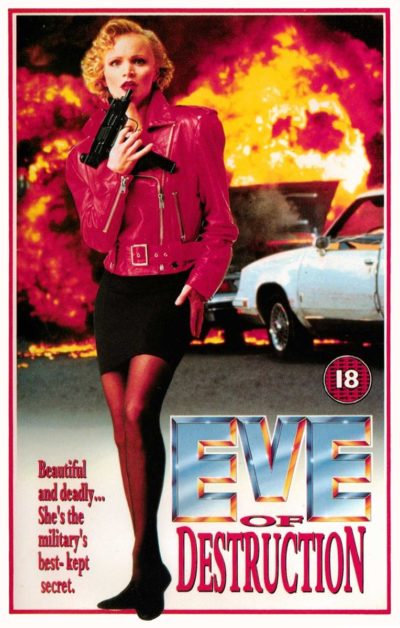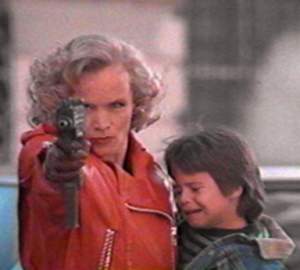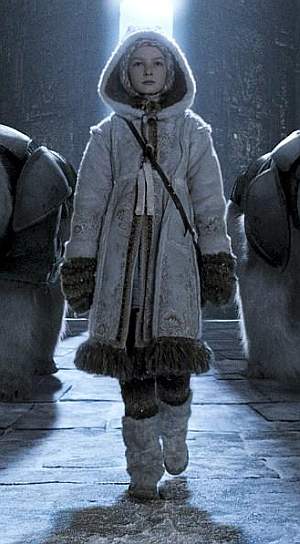I miss Buffy.
Month: March 2009
Day Night Day Night
★★★½
“Is it live, or is it Semtex?”
 This is one of those which split the panel here. Chris was thoroughly unimpressed with its lack of a well-defined conclusion: “I knew it,” she muttered, “As soon as I saw this had a woman writer/director.” Certainly, if you are looking for a clear, structured thriller, this won’t be for you. Explanations are notable by their absence, as we learn about a young girl, preparing to stage a suicide bombing in Times Square. Who is she? Why is she doing this? What group is helping her? We never really learn explicitly. There are occasional clues, such as an Islamic-themed backdrop in front of which she is carefully posed for the traditional video, but as we never get to see the video, it’s inconclusive. We get hints of family trauma: she says her parents are dead, but later on, calls them from a payphone, and the only possession she wants to keep is a photo of a kid brother. But “Leah Cruz” – the woman whose identity she adopts, and on which she is relentlessly quizzed by the cell commander (Weinstein) is basically a blank canvas, onto which you can project whatever you want. “I have only one death and I want my death to be for you,” she says at the start; that’s as much of an explanation as you’ll get.
This is one of those which split the panel here. Chris was thoroughly unimpressed with its lack of a well-defined conclusion: “I knew it,” she muttered, “As soon as I saw this had a woman writer/director.” Certainly, if you are looking for a clear, structured thriller, this won’t be for you. Explanations are notable by their absence, as we learn about a young girl, preparing to stage a suicide bombing in Times Square. Who is she? Why is she doing this? What group is helping her? We never really learn explicitly. There are occasional clues, such as an Islamic-themed backdrop in front of which she is carefully posed for the traditional video, but as we never get to see the video, it’s inconclusive. We get hints of family trauma: she says her parents are dead, but later on, calls them from a payphone, and the only possession she wants to keep is a photo of a kid brother. But “Leah Cruz” – the woman whose identity she adopts, and on which she is relentlessly quizzed by the cell commander (Weinstein) is basically a blank canvas, onto which you can project whatever you want. “I have only one death and I want my death to be for you,” she says at the start; that’s as much of an explanation as you’ll get.
It is a cop-out, no question about it, and I can’t blame Chris for being annoyed: it’s both lazy story-telling and bad film-making to make the audience do all the heavy lifting, as Loktev does here. However, I tend to think it occasionally does the brain good to give it a workout, and let’s be honest, the Girls With Guns genre isn’t usually the place to find such an exercise. That doesn’t excuse the maddeningly unfinal ending, however, that is the film’s weakest moment. If Loktev had delivered a genuine conclusion – one way or the other, it doesn’t really matter – she would have been on much firmer ground. Up until then, I was willing to give the film the benefit of the doubt, with Williams providing a surprisingly strong core: excruciatingly polite, yet bent on committing the most awful destruction through her 40-pound backpack [“It’s mostly nails,” says one of the cell, helpfully].
The devil is very much in the details: she clips her toenails and requests a pizza, behaving more like a college girl than someone preparing to carry out mass murder. But would any terrorist group allow its human bomb to wander the streets aimlessly, rather than heading straight for the target? Surely every minute increases the risk of capture and failure? It’s in aspects such as this that the hyper-realistic feel – no incidental music, for example – breaks down, and you are reminded that what you’re watching is just as much cinematic contrivance as 24 or Vantage Point.
Dir: Julia Loktev
Star: Luisa Williams, Josh P. Weinstein
Eve of Destruction
★★★★
“Known as Terminator Woman in Spain, I can see their point.”

 While undeniably a product of its time – which would be 1991 – this has stood the test of time very well, and remains a solid piece of action SF. Eve Simmons (Soutendijk) is a researcher working for the US government on creating life-like robots for surveillance missions, and her creation, Eve VIII, not only looks like her, but has her memories and psychology too. When on a test run in San Francisco, Eve VIII is caught up in a bank robbery and a bullet sends her off the grid, and on her own mission. Jim McQuade (Hines), something like a proto-Jack Bauer, is brought in to track down the lost little robot, who has all of her creator’s complexes, but none of the social restraints, leading to a fondness for automatic weapons, which she uses with abandon as she works out her psychiatric issues [cheaper than counselling, and a good deal more fun]. Oh, and Eve VIII also has a nasty little surprise package tucked away inside. It’s up to McQuade and Simmons to stop the killing machine before things really get out of hand.
While undeniably a product of its time – which would be 1991 – this has stood the test of time very well, and remains a solid piece of action SF. Eve Simmons (Soutendijk) is a researcher working for the US government on creating life-like robots for surveillance missions, and her creation, Eve VIII, not only looks like her, but has her memories and psychology too. When on a test run in San Francisco, Eve VIII is caught up in a bank robbery and a bullet sends her off the grid, and on her own mission. Jim McQuade (Hines), something like a proto-Jack Bauer, is brought in to track down the lost little robot, who has all of her creator’s complexes, but none of the social restraints, leading to a fondness for automatic weapons, which she uses with abandon as she works out her psychiatric issues [cheaper than counselling, and a good deal more fun]. Oh, and Eve VIII also has a nasty little surprise package tucked away inside. It’s up to McQuade and Simmons to stop the killing machine before things really get out of hand.
Former pop-video director Gibbins [he did Wham’s Club Tropicana] makes a smooth transition to the action genre, and keeps things moving at a fine pace. It’s Soutendijk’s first European role – or rather roles, since she plays both human and cyborg, and she does a good job of splitting and defining them. Eve VIII has the kind of unfettered approach that’s fun to watch, wielding a Mac-10 with delightful abandon, and the image of Soutendijk in her red leather jacket, blazing away, is justifiably an icon of the genre. I particularly recall seeing the cardboard standee in the video-store which advertised the film. Sure, there are a number of convenient plot-holes [it’s never quite explained how Eve VIII tracks down her father through an army associate] and occasionally the budget and effects don’t prove quite up to the ideas the script wants to express. The subplot involving Eve’s son learning about genitals should probably have been removed entirely too: in these more-sensitive days, it comes across as creepy rather than anything.
 But as a straightforward B-movie, it works nicely, with Hines having a nicely sardonic wit: “A spinach lasagne, in a light tomato and basil sauce,” is the reply, when Simmons asks dubiously what is McQuade’s “specialty” as a government agent. I’m still trying to work out if the film is feminist or chauvinist: you could read it either way, with the ‘liberated’ (if robotic) woman a free spirit, though the ending firmly puts Even back in her place, to say the least. She also emasculates one man, somewhat familiar territory for Soutendijk, who previously wielded a scissors to leg-crossing effect in The Fourth Man. Gibbins, meanwhile, died in the 1993 Hollywood fires, while trying to rescue a cat. Guess there’s never an unstoppable robot around when you really need one.
But as a straightforward B-movie, it works nicely, with Hines having a nicely sardonic wit: “A spinach lasagne, in a light tomato and basil sauce,” is the reply, when Simmons asks dubiously what is McQuade’s “specialty” as a government agent. I’m still trying to work out if the film is feminist or chauvinist: you could read it either way, with the ‘liberated’ (if robotic) woman a free spirit, though the ending firmly puts Even back in her place, to say the least. She also emasculates one man, somewhat familiar territory for Soutendijk, who previously wielded a scissors to leg-crossing effect in The Fourth Man. Gibbins, meanwhile, died in the 1993 Hollywood fires, while trying to rescue a cat. Guess there’s never an unstoppable robot around when you really need one.
Dir: Duncan Gibbins
Star: Renee Soutendijk, Gregory Hines, Michael Greene, Kurt Fuller
The Golden Compass
★★★½
“While feeling incomplete, still a good primer for young action heroine fans.”
 There aren’t that many decent action heroine films for kids: much as I love Bloody Mallory or Kill Bill, they aren’t really child-appropriate. At the other end, films like the Harry Potter or the Narnia series, while containing female characters of some importance, sideline them in favor of the boys. That makes this a refreshing breath of fresh air, in that the heroine is firmly front and center as she goes through her adventures. It’s set in an alternate universe where people’s souls take the form of animals that accompany them everywhere, known as daemons. Childrens’ daemons shapeshift, but adults’ ones are static in form. Things are run by an authoritative group called The Magisterium, but Lord Asriel (Craig) who has found “dust” in a far Northern land, that could challenge the established order – the Magisterium have been kidnapping children for use in human experiments to counter dust. Into this is dropped Asriel’s niece, Lyra Belacqua (Richards), who is given the last golden compass, a device able to answer any question in the right hands. she is about to head North with Mrs. Coulter (Kidman), only to find she has a central role in the kidnapping – as Lyra’s best friend has now vanished, she bravely heads off, initially on her own, to rescue him.
There aren’t that many decent action heroine films for kids: much as I love Bloody Mallory or Kill Bill, they aren’t really child-appropriate. At the other end, films like the Harry Potter or the Narnia series, while containing female characters of some importance, sideline them in favor of the boys. That makes this a refreshing breath of fresh air, in that the heroine is firmly front and center as she goes through her adventures. It’s set in an alternate universe where people’s souls take the form of animals that accompany them everywhere, known as daemons. Childrens’ daemons shapeshift, but adults’ ones are static in form. Things are run by an authoritative group called The Magisterium, but Lord Asriel (Craig) who has found “dust” in a far Northern land, that could challenge the established order – the Magisterium have been kidnapping children for use in human experiments to counter dust. Into this is dropped Asriel’s niece, Lyra Belacqua (Richards), who is given the last golden compass, a device able to answer any question in the right hands. she is about to head North with Mrs. Coulter (Kidman), only to find she has a central role in the kidnapping – as Lyra’s best friend has now vanished, she bravely heads off, initially on her own, to rescue him.
It’s a pretty cool adventure tale, with some stirring sequences and memorable characters – not least the armoured polar-bear (voiced by McKellen), who becomes Lyra’s protector. He doesn’t just sit around drinking Coke, let’s say, though the entirely bloodless nature of the battle sequences lessen the impact significantly, though is likely an inevitable result of the PG-13 certificate. It is satisfyingly full of strong female characters, on both sides: as well as Lyra and Mrs. Coulter, the witch queen Serafina Pekkala kicks almost as much ass as the polar-bear. But the film fails badly to tie up the ends, particularly Lord Asriel, who is kidnapped in the middle and then vanishes, almost without further mention, until a quick reference at the end. Admittedly, while there are decent reasons why – it was intended as the first in a trilogy – we are less concerned here with excuses than actuality. And in actuality, it peters out.
I have to say, I haven’t read the book on which this is based, but opinion generally finds the movie to be ‘dumbed-down’, not least for removing the book’s far greater criticism of religion [the Magisterium is a thinly-disguised version of the Catholic Church]. This is likely inevitable, given the film’s $180m budget, but didn’t stop a campaign to boycott the film – which worked rather better in the US than abroad. It took more than four times its US gross overseas – compare, say, the first Narnia film, where the foreign multiplier was only about 1.5. Its relative failure in America has thrown the sequels into doubt, especially in the current economic climate, and that’s a shame: the world could always use some more heroines, and what you get here is painfully and obviously unfinished. Maybe I’ll go read the books instead.
Dir: Chris Weitz
Star: Dakota Blue Richards, Nicole Kidman, Daniel Craig, Ian McKellen
Angel-A
★★★½
“Emotional Battle Angel.”
 Andre (Debbouse) is at the end of his tether, owing large amounts of money to at least three separate gangs. He decides to end it all by leaping off a Parisian bridge into the Seine below, but is beaten to it by the tall, leggy blonde, Angela (Rasmussen, who you may remember in a bathroom stall with Rebecca Romijn-Stamos in the opening of Femme Fatale). His suicide forgotten, he jumps in to save her, and as they sit, dripping on the river-bank she vows that she will repay his selfless act by taking care of him. This may not be quite the way he expects; for example, she hijacks a negotiation with one of the mobsters to whom Andre owes money, marches upstairs and emerges not long afterwards, the debt apparently forgiven and with tens of thousands in bonus cash. Just as important as resolving his pecuniary problems are the emotional ones which plague Andre, and Angela is perhaps even more adept at addressing those: his lack of self-confidence, trust issues, an inability to give or receive love and so on. She sees the good person who is buried very deeply, and slowly teases it out. For her name is almost literal: she’s an angel, sent down to save Andre from himself.
Andre (Debbouse) is at the end of his tether, owing large amounts of money to at least three separate gangs. He decides to end it all by leaping off a Parisian bridge into the Seine below, but is beaten to it by the tall, leggy blonde, Angela (Rasmussen, who you may remember in a bathroom stall with Rebecca Romijn-Stamos in the opening of Femme Fatale). His suicide forgotten, he jumps in to save her, and as they sit, dripping on the river-bank she vows that she will repay his selfless act by taking care of him. This may not be quite the way he expects; for example, she hijacks a negotiation with one of the mobsters to whom Andre owes money, marches upstairs and emerges not long afterwards, the debt apparently forgiven and with tens of thousands in bonus cash. Just as important as resolving his pecuniary problems are the emotional ones which plague Andre, and Angela is perhaps even more adept at addressing those: his lack of self-confidence, trust issues, an inability to give or receive love and so on. She sees the good person who is buried very deeply, and slowly teases it out. For her name is almost literal: she’s an angel, sent down to save Andre from himself.
After six years where he was involved in writing a dozen film and producing even more, this was Besson’s first film as director since The Messenger. Nice to see him back, and the decision to shoot the entire film in black-and-white adds to the fairytale feel, though sometimes it feels more like a Calvin Klein commercial than anything else. The contrast between the 5’10” Rasmussen, towering over the 5’5″ Debbouse like an Amazon, is also unique, and it’s the former’s attitude that makes it qualify here, in a way reminiscent of Run Lola Run. Angela is as relentless as a force of nature, and will let nothing and no-one get in the way of her mission; in this way, she also reminds me of Leeloo in The Fifth Element, or even Mathilda from Leon.
In terms of action, it’s more understated than I’d like: Angela could certainly kick the ass of everyone else in the film, but never needs to get out of second gear. However, the emotional content of the film is considerable, never more than in a single shot that seems endless, where Angela makes Andre stare into a bathroom mirror and look at himself for, probably, the first time in his life. It’s a beautiful moment of impressive heartfelt exposure, laying bare Andre’s soul and exposing the human heart beating inside the scam artist. If not quite the badass-oriented remake of Wings of Desire I was hoping for, it proves very satisfactory and a unique romantic fantasy. I hope Besson doesn’t forget to showcase his own talents as a director more often in the future.
Dir: Luc Besson
Star: Jamel Debbouze, Rie Rasmussen, Gilbert Melki, Serge Riaboukine




